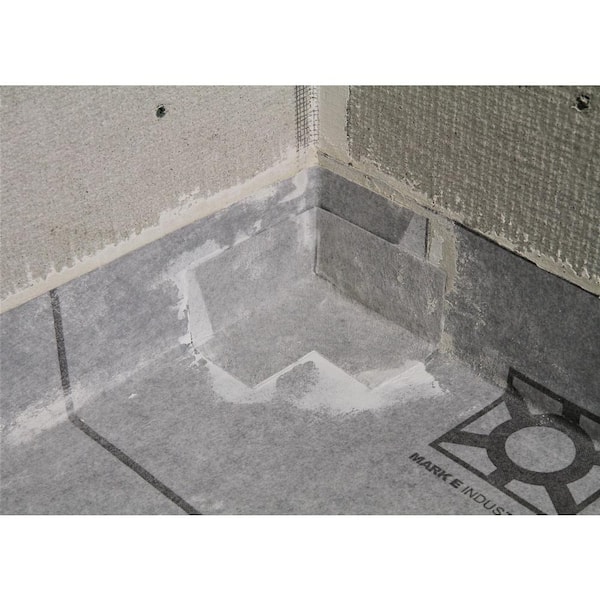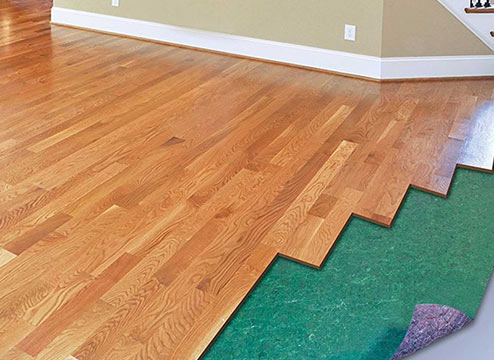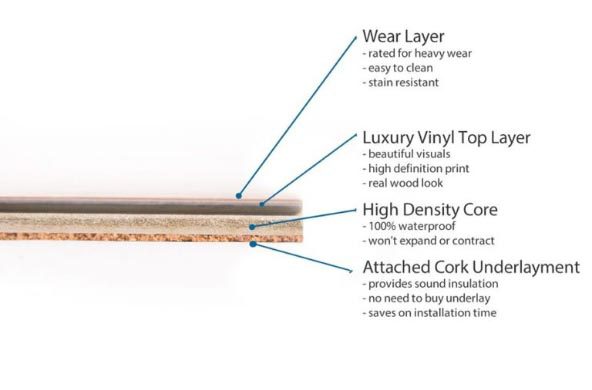Waterproof vinyl flooring does not necessarily need underlayment, but it is highly recommended for added moisture protection, sound dampening, and increased longevity of the flooring. While it may come at a higher cost, the benefits of using underlayment outweigh the disadvantages in the long term.
Underlayment is particularly useful for filling in subfloor imperfections and providing a smooth surface for the vinyl planks to lay on. By using underlayment, you can ensure a more stable and comfortable flooring installation. However, if you’re laying the vinyl planks over an existing cushion-backed vinyl floor or a below-grade tile floor, underlayment may not be necessary.

Credit: www.homedepot.com
Benefits Of Underlayment
Enhance your waterproof vinyl flooring with underlayment for added moisture protection, sound absorption, and increased durability. While not essential, the benefits of underlayment outweigh the costs in the long run. Elevate your flooring experience with these practical advantages.
Underlayment is often recommended when installing waterproof vinyl flooring, and for good reason. It offers a range of benefits that can enhance the performance and longevity of your floors. Here are some key advantages of using underlayment:
Moisture Protection
One of the primary benefits of underlayment is its ability to provide an extra layer of moisture protection for your vinyl flooring. Even though waterproof vinyl can resist water, underlayment acts as an additional barrier to prevent moisture from seeping through the subfloor. This is particularly important in areas prone to high humidity or potential water damage, such as bathrooms or basements.
Sound Dampening
Underlayment also helps to reduce noise transmission, making your vinyl flooring quieter and more comfortable to walk on. It absorbs impact and minimizes the sound of footsteps, eliminating the hollow or echoing sound often associated with hard flooring surfaces. This can be especially beneficial in homes with multiple levels or in apartments where soundproofing is essential.
Increased Longevity
In addition to moisture protection and sound dampening, underlayment can significantly increase the lifespan of your vinyl flooring. By providing an extra layer of cushioning, it helps to absorb the pressure and impact from daily foot traffic. This reduces the risk of wear and tear, allowing your floors to maintain their beauty and durability for many years to come.
Overall, while underlayment may come at an additional cost, its benefits far outweigh the cons. By protecting against moisture, reducing noise, and increasing longevity, underlayment ensures that your waterproof vinyl flooring remains in top condition for a long time.

Credit: www.msisurfaces.com
When Underlayment Is Not Necessary
Underlayment isn’t necessary for waterproof vinyl flooring, but consider the benefits like moisture protection and sound dampening. While optional, investing in underlayment can enhance flooring durability in the long run.
Existing Cushion-backed Vinyl Or Below-grade Tile Floor
If you already have a cushion-backed vinyl floor or a below-grade tile floor, you can save yourself the trouble of using an underlayment. These types of existing flooring already provide a suitable base for your waterproof vinyl flooring. The cushion-backed vinyl floor offers enough cushioning and support, eliminating the need for an additional underlayment. Similarly, below-grade tile floors are typically installed on a concrete subfloor, which provides stability and moisture resistance. Therefore, adding an underlayment in these situations would be redundant and unnecessary.
Self-sustainable Vinyl Flooring
Vinyl flooring itself can be self-sustainable and doesn’t necessarily require an underlayment to function properly. It is designed to be durable, resistant to moisture, and provide sufficient insulation. Therefore, if your vinyl flooring is of high quality and specifically engineered to withstand moisture, adding an underlayment may not be necessary. This is particularly applicable in areas where there is minimal risk of moisture intrusion, such as a well-maintained home or a climate-controlled environment.
Thin Vinyl Flooring
In some cases, underlayments may be recommended for vinyl flooring that is thin, as it tends to be more flexible and prone to bending. If your vinyl flooring is on the thinner side, using an underlayment can help provide additional stability and support. This can prevent the flooring from flexing too much, resulting in a more solid and durable installation. Additionally, the underlayment can help absorb minor imperfections on the subfloor, ensuring a smooth and even surface for your vinyl flooring.
In conclusion, while waterproof vinyl flooring can be installed without underlayment, there are certain circumstances where using an underlayment is not necessary. If you have an existing cushion-backed vinyl or below-grade tile floor, or if your vinyl flooring is designed to be self-sustainable and moisture-resistant, an underlayment may not be needed. However, for thinner vinyl flooring, using an underlayment can enhance stability and durability. Ultimately, the choice of whether or not to use an underlayment depends on the specific flooring type, subfloor condition, and desired level of support and performance.
Importance Of Underlayment For Vinyl Plank Flooring
When considering installing waterproof vinyl flooring, the question of whether underlayment is necessary often arises. Underlayment plays a crucial role in improving the durability, comfort, and performance of vinyl plank flooring. Understanding the importance of underlayment for vinyl plank flooring can help you make informed decisions for your flooring project.
Filling Subfloor Imperfections
Underlayment provides a smooth and even surface for the vinyl plank flooring by filling in any subfloor imperfections, such as small cracks, gaps, and uneven areas. This creates a stable foundation for the flooring installation, ensuring that the vinyl planks lay flat and securely, preventing premature wear and damage.
Improving Sound Absorption
Another significant benefit of underlayment for vinyl plank flooring is its ability to absorb and reduce sound transmission. The underlayment acts as a sound barrier, minimizing impact noise and foot traffic sounds, creating a quieter and more peaceful indoor environment.
Enhancing Comfort Underfoot
Installing underlayment beneath vinyl plank flooring enhances the overall comfort underfoot. It provides a cushioning layer that offers a softer feel when walking on the flooring, reducing strain and fatigue on the feet and legs. Additionally, the underlayment adds thermal insulation, providing warmth and comfort in colder climates.

Credit: www.rubberflooringinc.com
Frequently Asked Questions Of Does Waterproof Vinyl Flooring Need Underlayment
Does Waterproof Vinyl Need Underlayment?
Waterproof vinyl doesn’t require underlayment, but it’s recommended for moisture protection and sound dampening. It enhances longevity.
What Vinyl Flooring Does Not Require Underlayment?
In most cases, vinyl flooring does not require underlayment. However, using underlayment can provide extra moisture protection, sound dampening, and increase the longevity of the flooring. It is recommended to use underlayment for these added benefits.
Can You Lay Vinyl Flooring Without Underlay?
Vinyl flooring can be laid without underlay, but it is recommended to use underlayment for added moisture protection, sound dampening, and increased longevity. Underlayment is especially useful for thin vinyl flooring that may flex or bend easily. It also helps to fill in subfloor imperfections for a smoother surface.
What Happens If You Don T Put Underlayment Under Vinyl Plank Flooring?
Not using underlayment beneath vinyl plank flooring can result in uneven surfaces, causing creaking and popping noises when walked on. Underlayment can fill in subfloor imperfections and provide a smooth surface for the flooring. Adding underlayment offers extra moisture protection, sound dampening, and extends the flooring’s longevity.
Conclusion
While waterproof vinyl flooring doesn’t necessarily need underlayment, it’s wise to consider the added benefits it brings. Enhanced moisture protection, sound insulation, and prolonged durability outweigh the upfront cost. Ultimately, investing in underlayment can contribute to a more resilient and long-lasting flooring solution.


